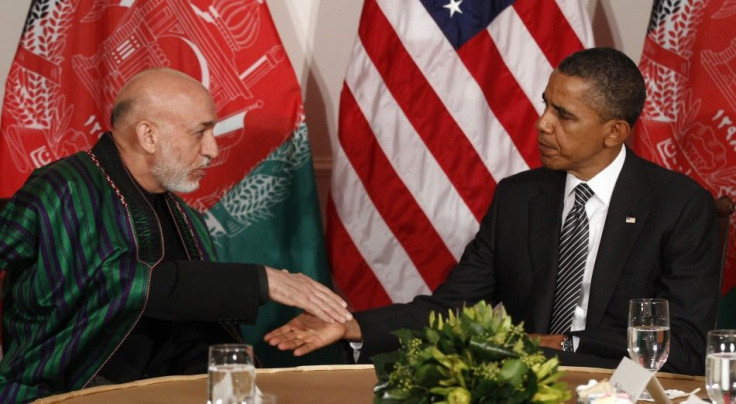Obama To Meet Karzai As Size Of 'Residual' US Troops In Afghanistan Under Discussion

President Barack Obama and Afghan President Hamid Karzai will meet Friday at the White House to discuss the future of the war and the security situation in Afghanistan.
Both leaders will discuss the next phase of the U.S. withdrawal from Afghanistan even as the Afghan administration revs up reconciliation efforts with Taliban insurgents.
The Obama administration faces pressure from Democrats and even some Republicans to speed up the transition of sercurity responsibility from U.S. and NATO forces to Afghan forces, while U.S. military officials claim that a hasty pullout could lead to a security vacuum that will favor the insurgents.
The Obama administration was considering keeping a force of 3,000 to 9,000 troops in Afghanistan after the scheduled withdrawal of U.S. forces in 2014, U.S. officials said Saturday, according to a New York Times report. The figure is much less than the 6,000 to 20,000 troops Gen. John R. Allen, the U.S. commander in Afghanistan, is said to have previously suggested.
The troops that will remain in Afghanistan are expected to be in charge of several missions, including raids against al-Qaeda and other terrorist groups that continue to thrive in the lawless border regions between Pakistan and Afghanistan.
The Taliban warned on Saturday that they would continue their offensive if any “residual” troops remained, according to the SITE Intelligence Group, an organization that monitors militant organizations.
In October, Karzai lashed out at Washington for not fighting the insurgents in their “safe havens,” implying that insurgent activity in neighboring Pakistan remained unchecked.
“NATO and Afghanistan should fight this war where terrorism stems from,” Karzai said at a news conference in Kabul.
“But the United States is not ready to go and fight the terrorists there. This shows a double game. They say one thing and do something else,” he said. “If this war is against insurgency, then it is an Afghan and internal issue, then why are you here? Let us take care of it.”
“But if you are here to fight terrorism, then you should go to where their safe havens are and where terrorism is financed and manufactured,” he said.
He criticized Western media for engaging in “psychological warfare” with the gloomy predictions about Afghanistan’s future after the withdrawal of the U.S.-led coalition troops in 2014.
© Copyright IBTimes 2024. All rights reserved.






















